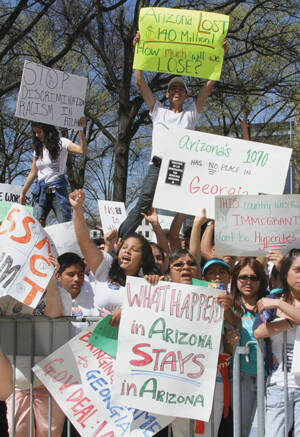When the U.S. Supreme Court considers the constitutionality of Arizona’s 2010 immigration law on April 25, the weight of an eventual ruling will come to bear on far more than one border state’s relationship to its own residents. A half-dozen states that have passed laws modeled on Arizona’s and 20 that have considered doing so could all be affected by the outcome of Arizona v. United States, as could the practices of churches, employers and social service providers. “Copycat” legislation roiled other states over the last year, particularly Alabama. That state’s law includes provisions that made it illegal to rent or provide utility service without proof of the customer’s immigration status. Thousands of immigrants moved away, leaving Alabama’s agriculture industry reeling.
The Supreme Court is being asked to settle the constitutionality of four key provisions centered on the question of whether immigration is solely the enforcement concern of the federal government or whether states can act independently. These key provisions require that state and local law enforcement verify the immigration status of every person arrested or detained if there is “reasonable suspicion” the person might be in the country without permission, make it a crime for immigrants to fail to carry their “alien registration document,” criminalize working for pay without authorization from immigration authorities and allow officers to arrest someone without a warrant if the officer thinks there is “probable cause” that the subject is guilty of a crime that could lead to deportation.
A friend-of-the-court brief filed by the U.S. Conference of Catholic Bishops notes the church’s teaching on family unity and the government’s interest in having immigration policies that enable families to stay together. It also said state immigration laws pose “a serious threat to religious liberty” by criminalizing acts of assistance to undocumented immigrants. Churches have a moral and religious duty to help all in need, according to the brief, and Arizona’s S.B. 1070 and similar laws “threaten this Catholic mission to provide food, shelter and other care to all.”
The U.S. bishops argue that “a patchwork set of state ‘harboring’ regulations like those of S.B. 1070 would seriously threaten the Catholic Church’s mission to serve all in need. The effort of the United States to establish a single set of immigration laws thus constitutes a sound federal objective that this court should particularly respect.”
Another amicus brief, joined by more than 50 Catholic, Protestant, Muslim and Jewish organizations, argues that Arizona’s law assumes every person fits into one of two categories, “lawfully present” and those who are not. “In reality, even U.S. citizens often will not be readily identifiable, and where noncitizens are concerned, determining a person’s immigration status requires a nuanced legal inquiry, which cannot be performed by police on the beat.”
The brief, whose signers include the Leadership Conference of Women Religious, the Franciscan Action Network and about 30 congregations of women religious, said the court’s ruling will “shape the fates of people nationwide.”
“In states such as Utah, Indiana, Georgia, Alabama and South Carolina, people of color will be subjected to constant scrutiny regarding their immigration status—and to the demeaning experience of criminal arrest and detention,” it said. State immigration laws “divide our nation between those regions where people of all ethnicities can freely travel, live and work and those where they cannot.”








